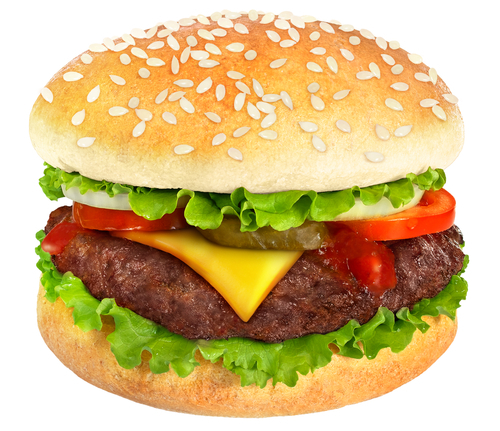Are Cheeseburgers Bad For You?
Also Known As: hamburger / burger topped with cheese
Short answer
Depending on how you make your cheeseburger, it can either be healthy or dangerous. Foods high in fat build up bad cholesterol and can lead to various problems. However, an extra lean cheeseburger with toppings from the various food groups will give your body most of the nutrients it needs.
Recommended Alternative
A fairly even ratio of beneficial and harmful qualities. Moderation is important. Very general topics that can lean towards both sides of the spectrum will be placed here as well. Rice, for example, can be good or bad depending on the type.
View Full Grading System
Category 'A'
Very healthy and numerous health benefits. Side effects are rare. Things rated an 'A+' are typically necessary for survival (for example, water).
Very healthy and numerous health benefits. A few harmful qualities may be associated, but only under certain circumstances such as an allergic reaction.
Very healthy and numerous health benefits. Harmful qualities may be associated, but aren't usually serious.
It is important to note that even the best things in life can become bad in immoderate amounts. So, although something may be rated an 'A+', overconsumption/overdoing can bring unwanted effects.
Category 'B'
Very beneficial to your health. Things rated a 'B+' may have a few harmful qualities to pay attention to.
Overall beneficial to your health. Things rated a 'B' may have some harmful qualities to pay attention to.
More beneficial to your health than not. However, harmful qualities are most likely associated and shouldn't be overlooked.
The main difference between category 'A' and category 'B' is the harmful qualities typically present in 'B' items. Serious side effects are usually uncommon, but are still possible and should be taken note of.
Category 'C'
Both beneficial and harmful qualities associated. Things rated a 'C+' are typically a bit more on the beneficial side. Still, moderation is important.
A fairly even ratio of beneficial and harmful qualities. Moderation is important. Very general topics that can lean towards both sides of the spectrum will be placed here as well. Rice, for example, can be good or bad depending on the type.
More harmful than beneficial. Side effects are common, especially when consumed/done excessively. Moderation is very important.
Category 'C' usually denotes to both good and bad qualities. When it comes to this category, it is important to keep this word in mind: moderation.
Category 'D'
Harmful to your health. Although benefits may be associated, the bad most likely outweighs the good. Moderation is very important.
Harmful to your health. A few benefits may be associated, but the bad outweighs the good. Moderation is extremely important.
Harmful to your health. Very few, if any, benefits are present. Things in this category should be avoided as much as possible.
Category 'D' is typically for things that are more harmful than beneficial. While consuming/doing something unhealthy once in a blue moon shouldn't hurt, we definitely recommend eliminating 'D' items as a regular part of your routine/diet.
Category 'F'
Category 'F' is for things that fail to bring anything beneficial to the table, and are very harmful to your health. We recommend completely avoiding anything in this category. Long-term side effects of 'F' items are usually very serious.
Category 'N'
'N' stands for neutral. Things placed into this category are generally (a) neither good nor bad for you, or (b) lack the necessary evidence to reach any conclusions.
Long answer
There is little doubt about the negative health effects of getting a cheeseburger from a fast food joint. However, what about cheeseburgers served at a BBQ party or just in your own home for an easy-to-make family meal? Since cheeseburgers made at home vary from person to person, it is impossible to give a definitive answer as to whether or not your particular cheeseburger is good for you or not. A general answer to the question would be to say that if you use the right ingredients, the right type of meat, and don't overindulge - then cheeseburgers can actually be rather good for you.
Let's take a look at the typical ingredients for a cheeseburger - bread, a beef patty, and cheese. Before thinking about various other condiments and other toppings that go on many cheeseburgers (onions, pickles, barbecue sauce, ketchup, mustard, just to name a few), you can see that these three alone lend themselves to a wide range of interpretation.
If you use white bread, regular beef patty, processed American singles and load your cheeseburger with bacon and barbecue sauce, then each cheeseburger you eat would significantly raise your cholesterol and be a proverbial "heart attack waiting to happen." Eating fatty foods also leads to problems such as bloating, gas, heartburn, and nausea. However, if you use whole grain bread, extra lean beef, and real cheese, such as sharp cheddar, and add lettuce, pineapple, and mustard, then you have a meal that uses all the food groups and is rather healthy for you (if you enjoy just one or two).
If you are trying to stay away from beef, you can also use turkey meat or pork as a substitute. Vegetarians can also make cheeseburgers using a tofu patty.
Possible short-term side effects
- bloating
-
gas
-
acid reflux
-
heartburn
-
nausea
Possible long-term side effects
- cholesterol buildup
-
weight gain
-
cardiac disease
-
cancer when processed ingredients are used
Ingredients to be aware of
Healthier alternatives
- veggie burger
-
chicken and cheese sandwich
-
black bean burger
Our Wellness Pick
(what is this?)
Veggie Burger Starter
- Plant-based protein
- Easy meal prep
- Nutrient-rich
- Convenient cooking
- Customizable flavors
Learn More!
Please turn your Ad Blocker off to see this content. Thank you!
Thank you for your feedback!
Written by Jeff Volling
Published on: 01-02-2016
Last updated: 12-15-2023
Thank you for your feedback!
Written by Jeff Volling
Published on: 01-02-2016
Last updated: 12-15-2023
 Approved by
Approved by 















